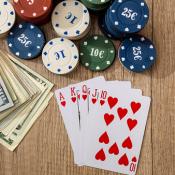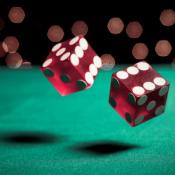How Can I End My Gambling Addiction for Good?
Dear GoodTherapy.org,
I first got a taste for gambling as a teen, far younger than anyone should have been exposed to it, online. I found those websites that let you bid on electronics and gadgets for dirt cheap, and I was completely mesmerized by the countdown timers. I love the feeling of seeing those last few seconds, and the rush of having so much power with just the press of a button at the exact right time. Luckily, I lost the bidding wars the vast majority of the time and didn’t have to pay for much (a couple inexpensive watches, maybe). But once it was legal for me to go to casinos, a whole new world opened up. I was taken in by all of it—flashing lights, friendly electronic noises, themed slot machines with sexy graphics … you name it, if it was in a casino I wanted to dominate all of it. Until I was out of college, I managed to limit myself to casino visits only when my buddies were going, and I stuck to blackjack and slots when I was there.
But as soon as I graduated, I found myself in a highly lucrative tech job working with older men who frequented casinos—legit “high rollers.” I felt like I had found my people. I made it my business to learn every game. I researched tips and tricks endlessly, especially for poker. The best part was feeling like I was earning the respect of my superiors at work every time I dragged myself into work with a hangover earned over hours of poker hands or treated them to a decadent lunch with my winnings. Or, after I got married, being able to gift my wife unexpectedly with nice earrings or an expensive wine.
That was the high point, I guess. Everything has gone downhill since then in a horrifying combination of alcohol and debt. My wife was sympathetic at first, but she lost patience with me when I was consistently unable to contribute to house payments and general expenses. We agreed it would be best for me to find another job, so I did that and managed to cut back dramatically on drinking. But I have never been able to stop gambling. I’ve hidden it and tried everything to stay home from the casino, but I inevitably gravitate back to online poker and bidding wars. I am now separated from my wife, I have started drinking more to try to distract myself, and I have amassed a shameful amount of debt.
I’m writing to you terrified for my family, my friends, my bank account, and my own health. Please, please help me stop gambling for the sake of my loved ones and small amount of savings I haven’t yet squandered on this horrible “hobby.” —Beaten by the Game
Dear Beaten,
Thank you for sharing this harrowing tale, one I am sure countless others can relate to. In fact, if you removed “gambling” and replaced it with any number of other compulsive behaviors—using drugs, viewing pornography, and so on—you might be startled to know how many millions of people in the U.S. alone have struggled with the same nightmare. The good news is you’re taking the first step in doing something about it. Many never do.
Gambling itself is a most difficult addiction—or compulsive behavior, if you prefer—in that it involves money, a societal “must.” One can abstain from bars or social situations involving alcohol, and certainly other substances, but dealing with money in some fashion is inevitable. Also, the literal and emotional “costs” of this particular addiction are devastating, as your letter attests, leading to harsh economic consequences which can exacerbate a person’s already injured self-esteem.
In fact, if I had to guess, I would say your drinking may be fueled by the understandable pain of these circumstances, having lost what is so dear to you; such is the malady that slowly takes everything away of us, leaving nothing but misery. But things can change for you starting today.
I’m heartened by your letter in that you are taking a brave step in asking for help. This can, if you want, be your “bottom,” the end of the line for the destructive behavior and the beginning of a more stable and fruitful life. I have extensive personal experience with addiction, and professional experience in helping others get on a less self-destructive, happier road. It can be done with diligence and support.
In recovery, they call addiction a “rapacious creditor,” which sounds applicable here. When it comes to addictive behavior, the “house” always wins. And said house is usually merciless. Before we realize it, no matter how intelligent we are, it ends up running our lives; nothing and no one else—not our jobs, partners, children, families, nor friends—is more exciting than the idea of landing that “perfect score.” In recovery, they call it “chasing the dragon,” trying to capture or recapture the “perfect high.” We are often slow to notice the slowly mounting cost of keeping that search in motion.
You might want to look into an outpatient or inpatient program for gambling, if you have the financial resources or insurance. (Some programs take insurance, some don’t.) Some people find rehab invaluable, while others can proceed without it. If you’re interested in more information about rehab, you can search GoodTherapy.org’s rehab and treatment center directory or contact an addiction therapist via the site’s therapist directory.
So much of addiction’s power is initially unconscious. The “score” we are seeking, at bottom, has to do with our psyches, not our bank accounts or fleeting pleasures. Our souls and psyches are what ail us. Many addicted folks struggle with low self-esteem, shame, early trauma, abandonment issues, and so forth. Addiction distracts or numbs all of that.
I also urge you to acquaint yourself with the recovery program Gamblers Anonymous. Whether or not you “buy in” to the 12-step philosophy, you may find at least temporary help here. It’s crucial to find support among those who have faced similar consequences and strife. You would likely benefit from talking to people who “feel your pain” without judgment, who know what it’s like to be where you are, and who can suggest ways to begin rebuilding. It also helps to talk to those who understand the specific temptations of those “sexy graphics” and flashing lights and sounds of the casino—and constructive ways to replace those activities with something more sustaining. You can, as they say, “take what you like and leave the rest” when it comes to the program. You don’t even have to decide if you are quitting “for good” or for a week or a day. The crucial part is to get information about addiction and speak with those who really “get it,” and to find out what might work and what your intuition tells you is the next step.
So much of addiction’s power is initially unconscious. The “score” we are seeking, at bottom, has to do with our psyches, not our bank accounts or fleeting pleasures. Our souls and psyches are what ail us. Many addicted folks struggle with low self-esteem, shame, early trauma, abandonment issues, and so forth. Addiction distracts or numbs all of that. What we are seeking to “dominate” are the painful aspects of our inner struggle, which is why an external search for “payoffs” is always doomed. (This is true in general of materialist answers to soulful suffering, a complex subject, to say the least.)
Whatever you do, I urge you to find individual counseling or therapy as soon as possible. Talk to a few different therapists, meet with them if you can, and then pick one. If you don’t feel heard or understood, move on.
You will need to find a therapist who suits your needs and personality. Some people need “the hard truth,” others need a softer touch, and most need a combination of the two.
The important thing is someone who understands addiction, both its practical mechanisms and the underlying emotional impulses. Sometimes reassurance is precisely what is needed. There are also times, in the beginning especially, when taking action is most important. This is not always the case, but it’s sometimes important to “act” one’s way into better thinking, rather than the other way around; in this sense, treating addiction can feel counterintuitive, even disorienting. But this is the way it sometimes needs to happen. Act first, ask questions later. At other times, emotions need to be heard and processed in a safe space.
There are therapists, incidentally, who advocate total abstinence immediately, and others who practice what is called a harm-reduction model, meaning a plan to cut back gradually or start by curbing the most destructive behaviors. You will have to decide what is best for you. If you were in my care, I would recommend at least some initial period of abstinence from some, if not all, self-destructive behaviors, to get a sense of what emotional processes, needs, or desires underneath the behaviors are at work.
I think therapy is important, as time goes on, in trying to understand and reorganize such emotional impulses and processes. Such processes remain unconscious and unchanged as long as they remain unilluminated. It is painful but liberating to take an honest, albeit empathic, look in the mirror with the help of a trusted other.
For instance, you vividly describe the excitement and apparently open-ended possibilities of the casino. For many, this sensory stimulation makes up for an emptiness, numbness, or “deadness” that has haunted the person for years. The compulsivity thus provides a distraction that, in treatment or recovery, can be replaced with something less destructive to one’s existence.
Two last thoughts: One, it is not unusual to have a sense of loss, or powerful grief, when setting aside the behavior—even if you are doing so “a day at a time” (which is, practically, the only way possible). When I gave up drinking, I had a profound sense of loss, as if a very close friend had died. It took me a while to see drinking had been a part of my core identity, going back years, including drinking in high school, college, growing up with alcohol-addicted parents, and so on.
Grief and loss are infrequently addressed in recovery circles, for some reason. But these are important concepts to acknowledge—not only the hope of a better life, but the sorrow over the wreckage of what is left behind.
Finally, and as alluded to above, there is no quitting “once and for all.” Nothing of sustained value can be done in advance; we really only have the present. I sincerely hope you make use of this window of willingness and take some of these steps today. There is absolutely no better time, as the consequences of addictive behavior—in my experience, at least—only become more costly. I’ll close with something I was told when I started recovery: “I don’t know if you’ll enter heaven, but you’ll certainly stop living in hell.” Thanks again for writing.
Kindly,
Darren
- 2 comments
- Leave a Comment
-

jacob
March 5th, 2017 at 7:56 AMI so appreciate the candor of those who write in here and ask these questions. I am fortunate to have never encountered something like this in my own life but I know that I am lucky and that one wrong move somewhere along the way could have put me into the same place in which you find yourself. It is not that I read here to look down on other people but it truly opens my eyes to the pain and worries that I have not yet experienced and hopefully will give me a greater understanding if I do at some point go through this on my own or witness a friend or loved one going through it. Your own challenges make me hopeful for what so many of us can learn here.
-

Carla
March 7th, 2017 at 2:21 PMIn some ways it seems like an addiction to gambling would be one of the hardest ones to break free of. It is not like you can simply take away this substance or retrain your body so to speak to go without those chemicals.
I guess it is more like the high is caused by something else, something that could be a little more difficult to control, and since it is so arbitrary, there is no one thing that you can point to and say yes, this is what I am addicted to.
It is more like a feeling of what you get being involved in the activity I guess? Anyway I don’t really know but I know that there are many who have lost everything that they own because of it.
Leave a Comment
By commenting you acknowledge acceptance of GoodTherapy.org's Terms and Conditions of Use.

 How Do I Choose a Residential Treatment Center?
How Do I Choose a Residential Treatment Center?  Feeling-State Addiction Protocol for Gambling Addiction
Feeling-State Addiction Protocol for Gambling Addiction  Is It Simply a Betting Hobby or a Gambling Addiction?
Is It Simply a Betting Hobby or a Gambling Addiction?